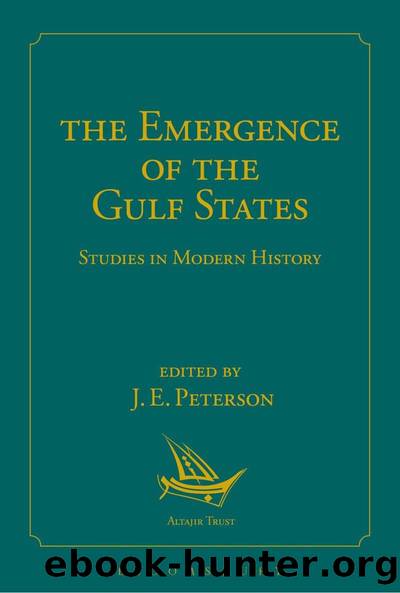The Emergence of the Gulf States by J. E. Peterson

Author:J. E. Peterson [Peterson, J. E.]
Language: eng
Format: epub
ISBN: 9781472587602
Barnesnoble:
Publisher: Bloomsbury Academic
Published: 2016-06-16T00:00:00+00:00
Notes
1The early modern Ibadiyyah was anchored in tribal organization and was close to Sunni Islam in doctrine and law. Ideally, leading ʿulamaʾ elected the ruler, called imam, who them received the oath of allegiance from tribal shaykhs.
2When that governor, John Child, took office in Bombay, he was faced with a large company debt â perhaps close to £280,000 â owed to Surat merchants. By literally pirating assets and exerting pressure on Mughal merchants, he hoped to bully his way out of the obligation. To their credit, many of his English contemporaries in the region criticized his tactics, and he died in India before he could be banished on Aurangzebâs demand.
3The fleet depended on the monsoonal pattern, so it did not often line up with the lunar calendar hajj. Pilgrims would bring with them goods to sell to offset the expenses of staying in the Hijaz until the pilgrimage occurred or else would hire agents to sell their goods when the market was advantageous.
4Other cross-regional, early modern groups based on familial, ethnic or religious identities were Jews, Multanis and Khatris.
5This was not an unprecedented process. For example, Sanjay Subrahmanyam provides a brief overview of western Indiaâs coastal merchant states from the fifteenth and sixteenth centuries, some that were subject to the ebb and flow of Vijayanagaraâs control.
6Two prominent individuals who were feared in this regard were Mir Muhanna (d. 1769) of Bandar Rig and Rahma ibn Jabar (d. 1826) of Kuwait and Qatar.
Download
This site does not store any files on its server. We only index and link to content provided by other sites. Please contact the content providers to delete copyright contents if any and email us, we'll remove relevant links or contents immediately.
The PFLP's Changing Role in the Middle East by Harold M. Cubert(141)
100 myths about the Middle East by Fred Halliday(133)
Revolution Without Revolutionaries by Bayat Asef(109)
US Nation-Building in Afghanistan by Conor Keane(104)
The Emergence of the Gulf States by J. E. Peterson(95)
Islam, Nationalism and Communism in a Traditional Society by Gabriel Warburg(84)
A Grammar of Ugaritic by John Screnock; Vladimir Olivero(77)
The Islamic Polity and Political Leadership: Fundamentalism, Sectarianism, and Pragmatism by Mehran Tamadonfar(65)
All the World Is Awry by R. Kevin Lacey(65)
Islam, Nationalism and Communism in a Traditional Society: The Case of Sudan by Gabriel Warburg(49)
Islamic Law in Circulation by Mahmood Kooria;(46)
Amazigh Politics in the Wake of the Arab Spring by Bruce Maddy-Weitzman(34)
